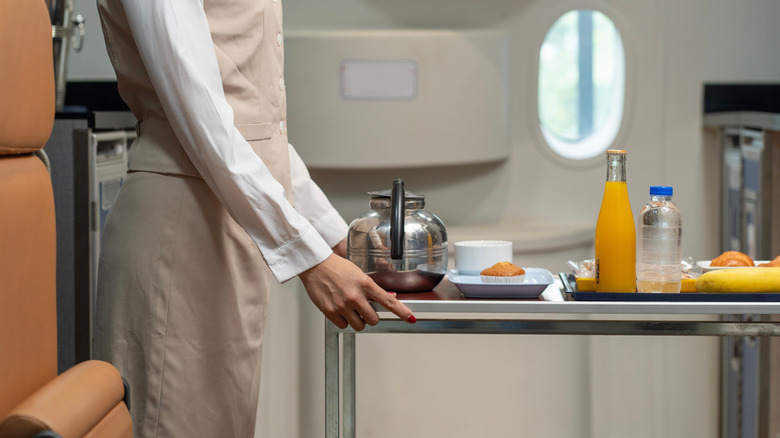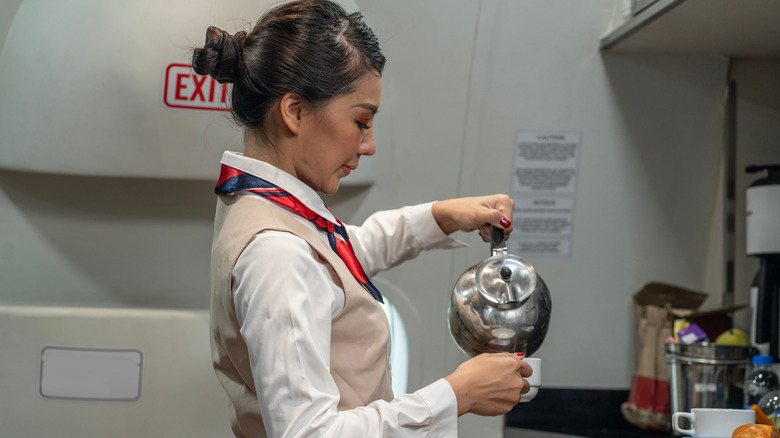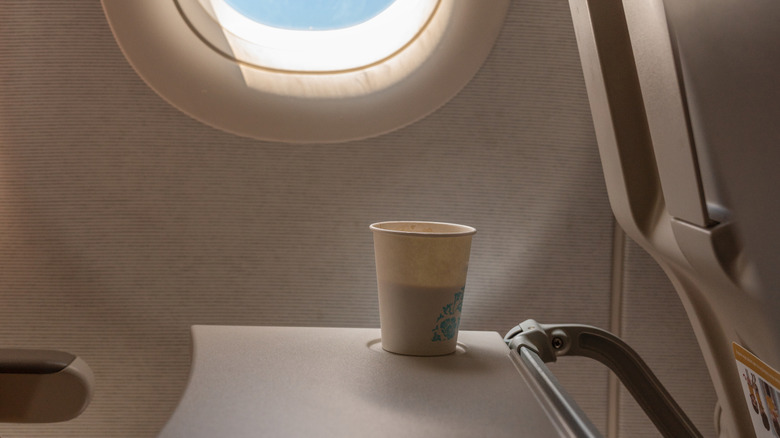The Airplane Drink Myth You Have To Stop Believing
Airline travel may once have been glamorous, but that was a long, long time ago. Now it's often nothing but one long hassle, and that's even before you get on the plane. Once you're safely aboard, there are other hurdles to navigate, including the sometimes questionable in-flight meals – that is, if you get fed at all. If you're flying economy class, you might find that even the cheapest snacks and drinks aren't much of a bargain, and let's not even get into the legroom. One myth that isn't true, however, is that airline coffee isn't safe to drink. Barbi, a flight attendant with nearly 40 years in the business, explained why this isn't the case.
The water used to make the coffee, she told us, comes from tanks of potable water carried on board the plane. She noted that there are two separate reservoirs: one for the bathrooms and the other for drinking. Even if you're dubious about drinking plain water on board a plane, Barbi said, "The water used to make tea and coffee is boiled at nearly 195 degrees Fahrenheit on the airplane, which is enough to kill bacteria in most circumstances. Add to that the cleaning and maintaining of the water tanks, and yes, coffee and tea are safe to drink on an airplane. If it wasn't, we wouldn't be serving it for decades and across thousands of flights every day."
Airline crews all drink the coffee
Barbi debunked yet another myth surrounding airline coffee, telling The Takeout, "There's no truth to the rumor that flight attendants, or pilots, for that matter, don't consume coffee or tea on an airplane ... We all drink it. I've been flying for nearly 40 years and have been drinking coffee from the airplane for that long." She says the crew isn't bothered by the water being kept in holding tanks because the tanks are cleaned regularly, as are the pots in which the coffee is brewed.
The water tanks are also inspected four times a year for bacteria such as E. coli. This rule is enforced by an EPA division known as the Aircraft Reporting and Compliance System. Even with the necessity of inspecting for waterborne bacteria, Barbi insisted, "This won't stop me or the thousands of other airline crew members from drinking coffee or tea from the airplane unless there is an outbreak directly tied to the potable water on the airplane." She went on to say, "In my decades-long career ... I've not had nor seen an outbreak of problems from drinking coffee or tea on the airplane for myself or my numerous colleagues, which tells me that for the most part the airlines are doing their job and keeping the potable water tanks clean and free from bacteria."
The real issues with airline coffee
Airline coffee does have a few downsides, but not a one of them is life-threatening. One problem is that it may not be of the highest quality unless you're flying first-class or have scored a ride on a private luxury jet. "If you like a delicious cup of coffee, then bring one from your favorite coffee shop in the airport," Barbi quipped. She went on to admit, "Airplane coffee isn't really that tasty, but for crews it's a necessity." She also reminded us, "If you want to sleep, avoid coffee and tea."
One more reason why you might want to limit your coffee consumption, especially on a longer flight, is that, as Barbi told us, "Drinking too much coffee can dehydrate you," and this comes on top of the dehydration caused by the airplane cabin's low levels of humidity. Barbi noted, though, that the same consideration applies to alcohol. Her advice: "Try to switch to a one-for-one coffee/tea/alcohol-to-water ratio if you're doing either or both."


